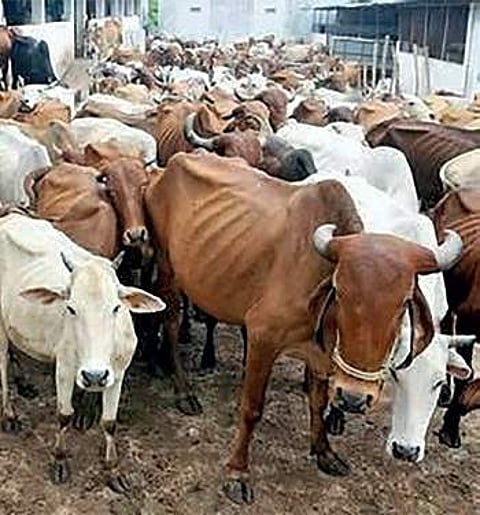

HYDERABAD: In a significant judgment amid the raging controversy over new cattle trade rules, the High Court on Friday referred to cow as a “sacred national wealth” and directed the AP and TS governments to amend penal laws for taking severe action for offences committed against animals including cows and buffaloes.
Justice B Siva Sankara Rao passed the order on a petition filed by Ramavath Hanuma of Nalgonda against a local court which, on Feb 3, dismissed a plea for return of 63 cows and two bulls seized at Kanchanapalli.
The petitioner and other accused secured cows and bulls for slaughtering and distributing the meat on Bakrid. He engaged the petitioner (A2) to buy cows and bulls from farmers. Following a tip-off, police seized the cattle and registered cases for offences under Sections 5, 6 and 10 of Prohibition of Cows Slaughter and Animal Preservation Act II of 1977 and 11 (1)(b) of Prohibition of Cruelty to Animals Act, 1960. The local court ordered the cattle be handed over to Gowshala.
Seeking return of the cattle to the petitioner, his counsel said animal sacrifice to god in religious functions or otherwise was no offence. The public prosecutor said police were entitled to seize cows and bulls if they smelt a rat and it was not wrong to entrust their custody to Gowshala.
Justice Siva Sankara Rao observed: “In this country, Bharat, to the majority of population cow is a substitute for mother who, in turn, is a substitute for god. The cow acquires a special sanctity and is called “Aghnya” (not to be slain). Thus, cow is a sacred national wealth and no one can kill or sell it for slaughter.”
From the wording of Section 102 CrPC, it is very clear that any police officer may seize any property which may be alleged or suspected to have been stolen or found in circumstances which create suspicion of commission of any offence. The cows and bulls in question are within the meaning of such property. As for religious sacrifices, he said, the SC had, in Ashutosh Lahiri case, concluded there was no fundamental right of Muslim to insist on slaughter of healthy cows on Bakrid.
While refusing to interfere with the lower court’s order, Justice Rao directed the chief secretaries of the two states to take steps for amending Section 429 of IPC to make it non-bailable and Sections 11 and 26 of Prevention of Cruelty to Animals Act, 1960 for enhancing punishment at par with Section 429 IPC, if not more equally in Section 10 of AP Cow Slaughter Act, 1977, and to appoint a competent authority for taking care of the cow and other animals.
Dismissing the petition, he said issuance of certificate by a veterinary doctor that a healthy cow or bull or calf is not fit should be made a cognisable and non-bailable offence. For this, Section 10 of Cow Slaughter Act needs to be amended, he said and posted the matter to July 7.
‘BJP trying to suppress minorities, Dalits’
CPI state secretary Chada Dvenkat Reddy alleged that prohibition of cow slaughter rules is a conspiracy of the BJP and RSS. They are trying to suppress minorities and Dalits, he said.
Speaking to mediapersons at party office along with district secretary K Ramgopal Reddy on Friday, he said the BJP government has issued ban of cow slaughtering in order to suppress certain sections of people. CPI fights for the rights of eating habits and not to curb liberty, he said. In another programme, as part of Central committee directions, CPI activists staged protest at Kaman crossroads.